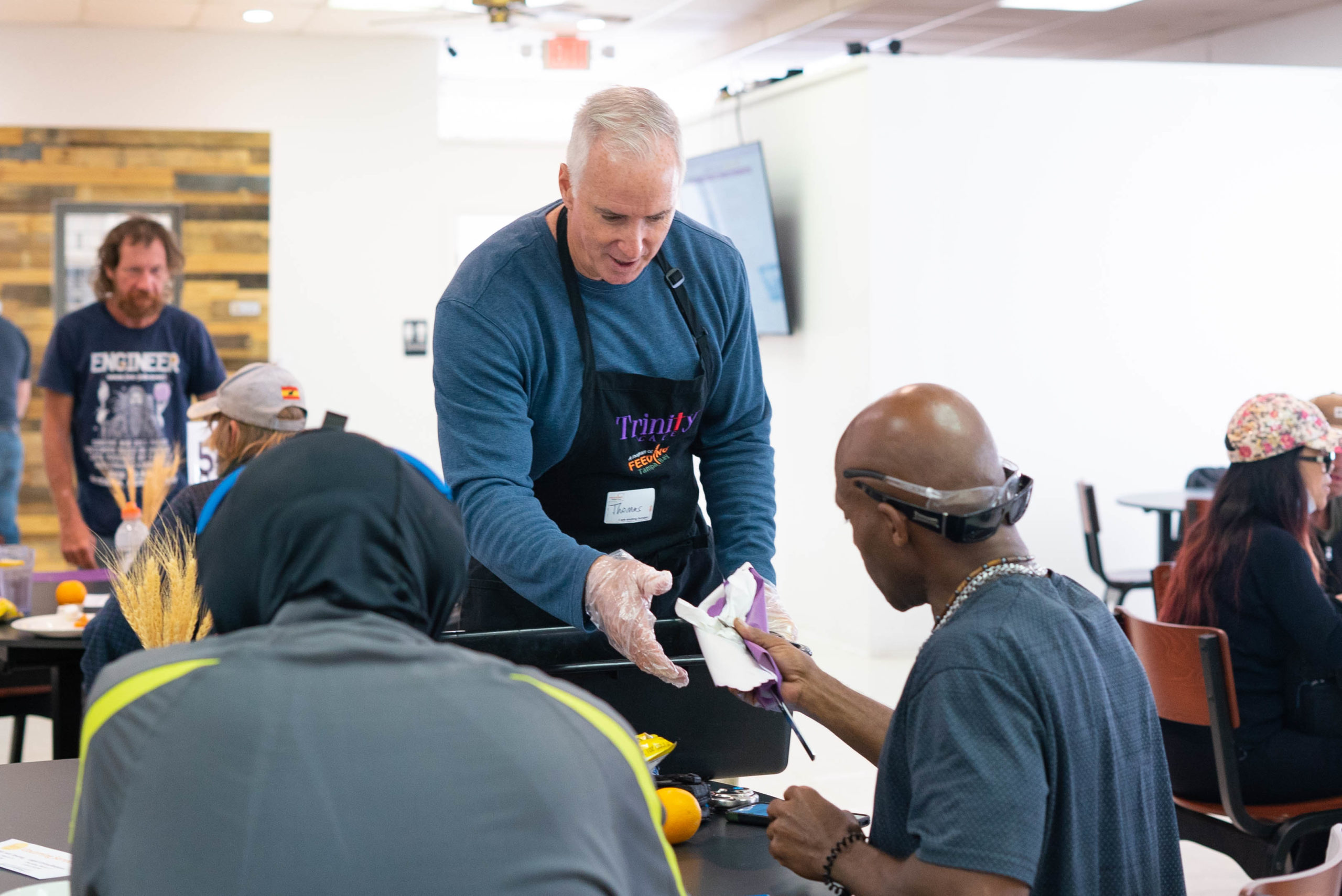Over the past 10 years, FTB has grown exponentially. From 40 employees to over 100. From one truck to a fleet of 65. From a handful of volunteer groups to a whopping 50,000 this past year alone! Through natural disasters and a pandemic that upturned the country, we’ve tried our best to stand tall and lend a hand to our community. We’ve seen the difference that our efforts have made, and it’s astounding. In 2022, for instance, we were able to serve 95 million meals across our ten counties. Simply put, the fire in our bellies won’t burn out.
Thomas Mantz, FTB’s dedicated CEO, has guided us through it all. But his wisdom goes well beyond the scope of food-banking. That’s why we wanted to highlight several pieces of insight that Thomas has gained in his decade as CEO. The quotes that follow come from two special episodes of our podcast, Stick a Fork in It. Listen here for the full, engaging discussions between Thomas and other members of our Feeding Tampa Bay family.
The importance of peace and quiet
“One of the nice things about my job is it puts me in front of a lot of different folks and around a lot of different folks. But as an introvert, it extracts a toll and I need a place to regenerate.”
In today’s fast-paced world, we rarely have the chance to slow down. There’s always another task we could be doing, another person to talk to, another opportunity to overexert ourselves. We endure a lot to enjoy a little. But, sometimes, stepping back and allowing yourself to relax helps you become more productive. It helps you understand yourself better and become aware of your strengths and limitations.
Take the time to do things that keep your spirit and mind balanced. Whether you read, meditate, exercise, or do something entirely different, unplugging from work or stressful situations is key to staying grounded.
On Diversity and working collaboratively - Teamwork makes the dream work
“We’re a kaleidoscope here…It’s what I love about this organization. We have a wrench for every nut.”
When working in a team, it’s important to ensure that every member feels like they are respected and cared for. Every role serves a unique purpose, and we owe it to ourselves to recognize the inherent value of those purposes. After all, our collective success hinges on that sort of recognition.
At FTB, our diversity is our strength. We’re able to extend our reach so far because there is always someone on our team who has the experience, passion, or curiosity to actively understand an issue within our community. Where there’s a problem, there’s always a person willing to step up and step in to fix it. We will always value that.
Though a situation may be difficult, we have a responsibility to act with empathy
“The most difficult thing [we can do is] to enter into a moment with another person who is at their lowest and say “I’m going to enter into that journey with you and I’m going to come alongside you until you can go off on your own.” I think there's bravery there we’ll never understand.”
The nature of FTB’s work means that, often, we become witness to some of the toughest and most vulnerable moments in a person’s life. We may never fully understand what one of our neighbors is dealing with, but we can try our hardest to walk through the minefield with them.
Change doesn’t happen overnight
“There’s a saying I love: that change happens where grace and effort meet. What I feel really good about is myself and everybody who has been along for this ride has really worked hard. But I think we’ve also had some grace along the way.”
Substantive change almost never comes about quickly or easily. Rather, it happens incrementally and often quite slowly. So, while we must continue to always operate at 100%, it’s okay for us to rejoice in the smaller moments. To become comfortable with the tiny steps rather than the big leaps. Furthermore, it’s okay to accept help and guidance from others. More often than not, that outside support broadens our own perspectives and strengthens our resolve.
You have to push through and look at the bigger picture
“There’s not a day that goes by where I’m not [both] enormously excited and scared to death…What you learn over time is that you hold both equally.”
There can be a lot of variability in the world. Some days we can be convinced that our solution to an issue is working. Other days, we may feel like nothing is going our way. And that can be scary. But it doesn’t mean we shouldn’t keep moving forward. Our sense of responsibility propels us upward despite the discomfort we may feel. Moreover, the fear of failure keeps us in check. It helps us analyze our actions to make sure they align with our overall mission.
In the nonprofit sector, where making a meaningful difference in the world is paramount, it can be easy to see ourselves as tiny actors with enormous shoes to fill. It’s wholly intimidating. But, in some ways, that perspective also grounds us. Are we going to fail sometimes? Yes, possibly. However, we have to keep trying. The issues we deal with are much bigger and much more important than our own momentary feelings of inadequacy.
Communication is key
“I often find that what I am thinking about or feeling or sensing is something I need to honor… There’s the talk you plan to give, the talk you gave, and the talk you wish you’d given. But I’m most often satisfied when I feel like I communicated what I want well.”
You don’t have to aim for perfection when communicating. But it can be helpful to share your perspective with others in the moment and be receptive to their ideas as well. Open communication is the beating heart that keeps teams going.
We have an obligation to uplift those around us
“We need to recognize that every human is worthy of care, consideration, grace, and support…everyone ought to be treated well.”
What, on a societal level, might need to change to prevent the suffering that we (especially those of us at FTB) see on a daily basis?
It’s a tough question. But Thomas has an idea. Everyone has been in need of support at some point. So it’s critical that we extend the same hand out to someone else when they need it too.
Although FTB has made significant progress over the last 40 years, we know that there are more people going hungry today than when we started. Thus, as we enter the new year, we need to revamp our approach. How do we ensure that our programs tackle prevention of food insecurity rather than intervention? How can we best act as a catalyst for change in our neighbors’ lives?
It starts by making sure that their story arcs maintain an “upward trajectory.” That we provide not only food, but also pathways toward stability.
We can only do that by acknowledging each of our neighbors’ inherent worth.







